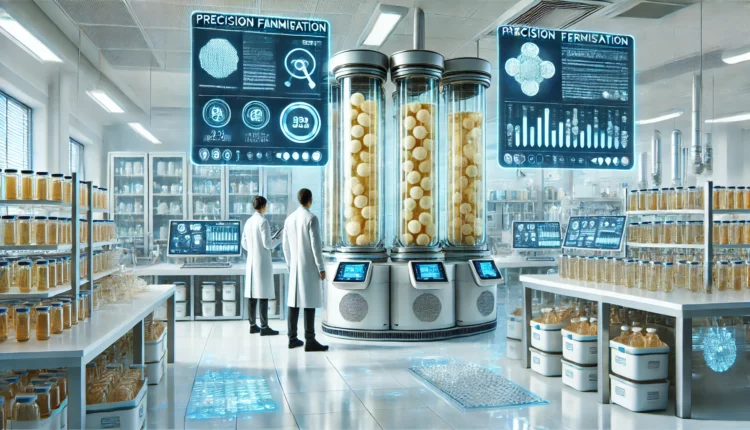In recent years, a remarkable technological advancement has emerged in the food industry known as Precision Fermentation Technology. This innovative method is reshaping how we think about food production, offering a sustainable and efficient way to produce a wide range of food products. In this article, we will explore the fascinating world of precision fermentation, its benefits, applications, and its potential to revolutionize our food systems.
Understanding Precision Fermentation Technology
Precision fermentation technology is a cutting-edge process that utilizes microorganisms, such as yeast, bacteria, or fungi, to produce specific proteins and other valuable compounds. Unlike traditional fermentation, which has been used for centuries to make products like beer, wine, and yogurt, precision fermentation is highly targeted and controlled. This allows for the production of a wide array of substances with high precision and consistency.
The process begins with the selection of a microorganism that can produce the desired compound. This microorganism is then genetically engineered to optimize its production capabilities. The engineered microorganism is cultivated in a controlled environment, such as a bioreactor, where it is provided with the necessary nutrients and conditions to thrive. As the organisms grow, they produce the target compound, which can then be harvested and purified for use in various food products.
Benefits of Precision Fermentation Technology
The advantages of precision fermentation technology are manifold. First and foremost, it offers a sustainable alternative to traditional food production methods. By leveraging microorganisms to produce specific compounds, precision fermentation reduces the need for large-scale agriculture and livestock farming, both of which have significant environmental impacts.
Moreover, precision fermentation is incredibly efficient. Traditional farming and animal husbandry are resource-intensive processes that require vast amounts of land, water, and energy. Precision fermentation, on the other hand, can be conducted in relatively small bioreactors, significantly reducing resource consumption. This efficiency translates to lower production costs and, ultimately, more affordable food products for consumers.
Additionally, precision fermentation technology allows for the creation of novel and innovative food products. By precisely controlling the production process, scientists can develop new flavors, textures, and nutritional profiles that were previously unattainable. This opens up a world of possibilities for food innovation, catering to diverse dietary preferences and requirements.
Applications of Precision Fermentation Technology
The applications of precision fermentation technology are vast and varied. One of the most promising areas is the production of alternative proteins. With the global demand for protein on the rise, traditional sources such as meat and dairy are becoming increasingly unsustainable. Precision fermentation offers a viable solution by producing high-quality proteins that can be used in plant-based meat and dairy alternatives.
For example, several companies are already using precision fermentation to produce milk proteins without the need for cows. These proteins are virtually identical to those found in cow’s milk, making them suitable for a wide range of dairy products, including cheese, yogurt, and ice cream. This not only reduces the environmental impact of dairy production but also provides options for individuals with lactose intolerance or dairy allergies.
Another exciting application is the production of food additives and flavorings. Precision fermentation can be used to create natural flavors, colors, and preservatives that are typically derived from plants or animals. This offers a more sustainable and consistent supply of these additives, reducing the need for intensive farming practices.
Furthermore, precision fermentation technology has the potential to address global food security challenges. By producing essential nutrients and bioactive compounds, precision fermentation can help combat malnutrition and improve the nutritional quality of food. This is particularly important in regions where access to diverse and nutritious foods is limited.
Precision Fermentation in Action
One of the most remarkable success stories of precision fermentation technology is the production of heme, the molecule responsible for the characteristic taste and aroma of meat. Impossible Foods, a pioneer in the field, uses precision fermentation to produce heme from genetically engineered yeast. This heme is then incorporated into their plant-based burgers, giving them a meat-like flavor and appearance that has captivated consumers worldwide.
Another example is Perfect Day, a company that uses precision fermentation to produce whey protein, a key component of dairy products. By harnessing the power of microorganisms, Perfect Day creates whey protein that is identical to that derived from cows, allowing them to make dairy products that are both sustainable and delicious.
The Future of Precision Fermentation Technology
The future of precision fermentation technology is incredibly promising. As the technology continues to advance, we can expect to see even more innovative and sustainable food products on the market. Researchers are exploring the potential of precision fermentation to produce a wide range of compounds, from vitamins and minerals to complex carbohydrates and fats.
Moreover, precision fermentation technology is likely to play a crucial role in the development of personalized nutrition. By tailoring the production process to individual dietary needs and preferences, precision fermentation can create customized food products that promote health and well-being.
However, the widespread adoption of precision fermentation technology is not without its challenges. Regulatory frameworks must be established to ensure the safety and quality of precision-fermented foods. Additionally, public perception and acceptance of these novel food products will be key to their success. Education and transparency will be essential in building consumer trust and understanding.
The Environmental Impact of Precision Fermentation Technology
One of the most compelling aspects of precision fermentation technology is its potential to reduce the environmental footprint of food production significantly. Traditional agriculture and livestock farming are significant contributors to greenhouse gas emissions, deforestation, and water pollution. Precision fermentation offers a more sustainable alternative by minimizing the need for these resource-intensive practices.
By using microorganisms to produce food compounds, precision fermentation reduces the demand for arable land, water, and energy. This not only helps mitigate the environmental impact of food production but also promotes biodiversity by decreasing the pressure on natural ecosystems. Additionally, precision fermentation can reduce food waste by providing a consistent and reliable supply of ingredients, minimizing the need for surplus production.
Furthermore, precision fermentation’s efficiency translates to lower carbon emissions. The controlled environment of bioreactors allows for precise monitoring and optimization of the production process, reducing energy consumption and waste. This makes precision fermentation a viable solution for addressing climate change and achieving a more sustainable food system.
Conclusion
In conclusion, precision fermentation technology represents a revolutionary approach to food production that offers numerous benefits. From its sustainability and efficiency to its potential for innovation and personalized nutrition, precision fermentation is poised to transform the way we produce and consume food. As we continue to explore and develop this technology, it is crucial to prioritize education, transparency, and regulation to ensure its success and acceptance.
By embracing precision fermentation technology, we can create a more sustainable, resilient, and equitable food system that meets the needs of a growing global population while minimizing our environmental impact. The future of food is here, and it is precision fermented.


Comments are closed.